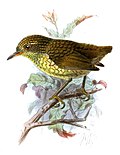| Purpletufts | |
|---|---|
 | |
| Male buff-throated purpletuft | |
| Scientific classification | |
| Kingdom: | Animalia |
| Phylum: | Chordata |
| Class: | Aves |
| Order: | Passeriformes |
| Family: | Tityridae |
| Subfamily: | Tityrinae |
| Genus: | Iodopleura Lesson, 1839 |
| Type species | |
| Pardalotus pipra [1] Lesson, 1831 | |
The purpletufts (Iodopleura) are a genus of birds in the family Tityridae. It has traditionally been placed in the cotinga family, but evidence strongly suggest it is better placed in Tityridae, [2] where now placed by SACC. These relatively small, short-tailed birds are found in the canopy of forests in tropical South America. Their name is a reference to the purple feather tufts on the flanks of the male, but these are often not visible when the wings are held closed, and females lack them entirely.



